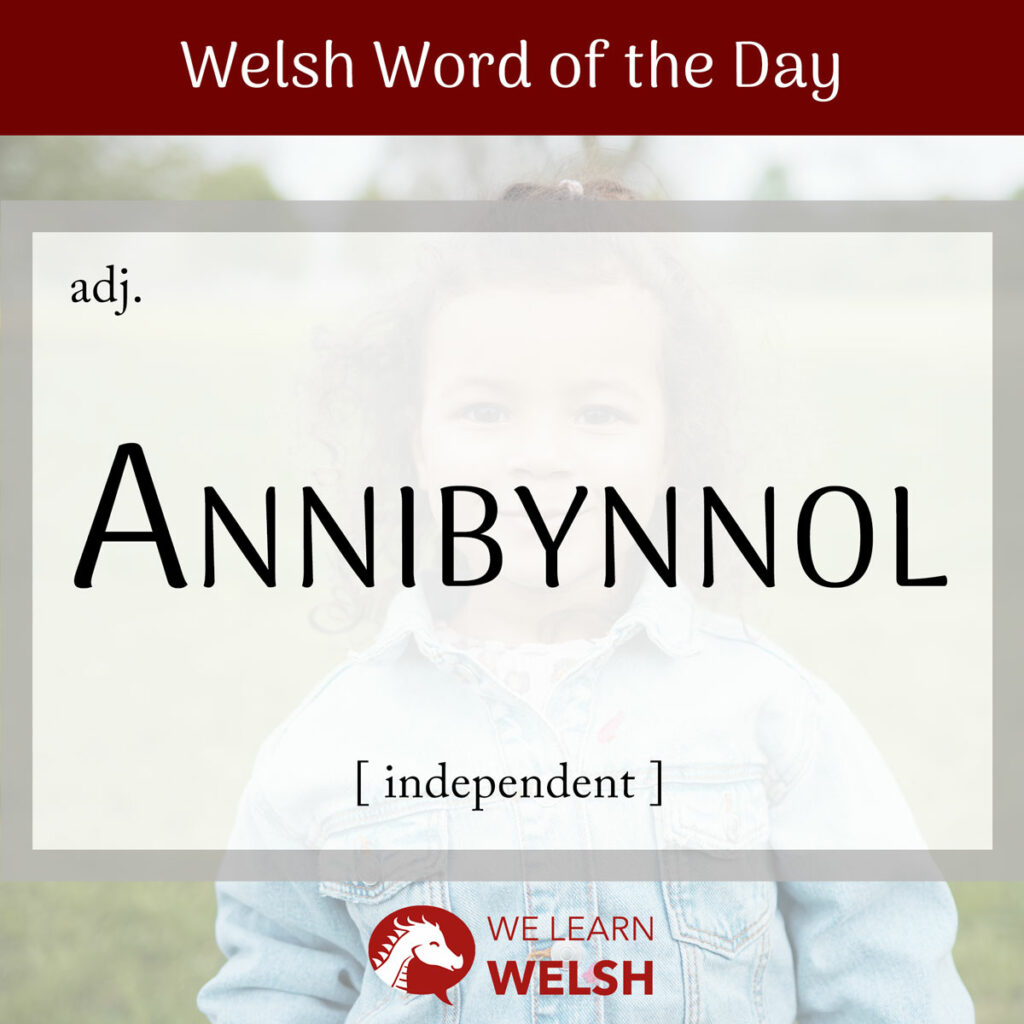Today’s Welsh word of the day is annibynnol, which means independent.
annibynnol
independent
Annibynnol, despite its meaning, does actually come from another word. This is dibynnol (dependent).
Dibynnol itself originates in the word dibynnu, meaning to depend. You can read more about dibynnu in our article on the word, but it originally comes from the same Latin root as the English word depend – hence their similar sound.
There are a couple more words derived from dibynnu that can also be made negative. Dibyniaeth (dependence) can become annibyniaeth (independence) and dibynadwy (dependable) changes to annibynadwy (unreliable). If you want to get super fancy, there’s even the tongue-twisting annibynadwyaeth (unreliability)!
Dw i am ddysgu gyrru, er mwyn bod yn fwy annibynnol.
I want to learn to drive, so I can be more independent.
You’ll notice that the letter d that appears at the beginning of all of these words has disappeared. This is because the negative prefix an has been added to the start and has caused a nasal mutation, so the d changes to a second n.
This internal nasal mutation is the only kind of mutation you need to worry about with annibynnol, though. Since it begins with a vowel, it doesn’t mutate itself at all. It also doesn’t change based on gender or number.
We often speak of being independent of or independent from something. Rhieni (parents) are a common way to finish this phrase!
In Welsh, the correct way to phrase independent of is actually with the preposition ar, even though it normally means on. So, you could say annibynnol ar y cwmni (independent of the company).
It is becoming a bit more common to say annibynnol o, which would be a literal translation of independent of or independent from; however, this phrasing is a direct and recent borrowing of the English grammatical structure, so many people might consider it less idiomatic or authentic.
And the word annibynnol also appears in a lot of compound terms, for example:
- newidyn annibynnol = an independent variable
- ymgeisydd annibynnol = an independent (political) candidate
- aelod annibynnol = an independent member
- corff annibynnol = an independent body
- cynghorwr annibynnol = an independent advisor
- eglwys Annibynnol = the Independent church
- gwlad annibynnol = an independent country
The last of these, of course, is a particularly important concept in Welsh politics and society.
Many Welsh people are passionate supporters of annibyniaeth i Gymru (Welsh independence). This refers to annibyniaeth gwleidyddol (political independence) from the rest of the United Kingdom.
A ddylai Cymru fod yn wlad annibynnol?
Should Wales be an independent country?
Those in favour of annibyniaeth i Gymru point out that Cymru is historically and culturally a separate and unique nation. We have our own traddodiadau (traditions), coginiaeth (cuisine), chwedloniaeth (mythology), diwylliant (culture), chwaraeon (sports), crefydd (religion), and of course, iaith (language).
Being annibynnol would allow the llwyodraeth (government) to focus on protecting those things, and would show respect to the history of the Welsh gwlad (nation). It would also allow us to decide our own polisi tramor (foreign policy) and prioritise our own economi (economy).
Welsh views on various political and economic issues often vary from the UK default, and Plaid Cymru, the party arguing for annibyniaeth i Gymru, has been gaining support fast amongst pleidleiswyr (voters).
However, there are benefits to remaining in the union, too. Cymru is generally poorer than the rest of the UK, and if annibynnol, we might face a diffyg ariannol (fiscal deficit). It can also be difficult for smaller gwledydd (countries) to gain recognition and protect their interests on the world stage.
Many also argue that although Cymru (Wales), Lloegr (England), yr Alban (Scotland) and Gogledd Iwerddon (Northern Ireland) all have different cultures, we share a common history and Celtic roots.
What do you think of annibyniaeth i Gymru? Share your views – let’s start a (friendly) discussion on Facebook!


